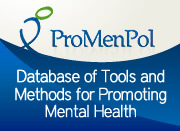Tools
- Utilities:
- Print this page
- Send this page
- Font size:
- Increase font size
- Decrease font size
Finnish Validation Completed for Hands Project
13/02/2011 - Submitted by: Solin Pia
The National Institute for Health and Welfare has completed the Finnish validation for Mental Health Promotion Handbooks by executing a group interview for ageing family carers (65+). This group interview was the second part of the validation which began with a group interview of elderly females. The participants were recruited with the help of The Association of Care Giving Relatives and Friends and it was arranged on January 18th in Pasila, Helsinki.
Six participants attended (four females, two men) the group discussions. Five of the participants were, or had recently been, family carers for their spouse. One of them took care of his former colleague.
The group discussion aimed to focus on themes of mental health of older people, as well as on preferred roles and tasks of professionals working with the elderly. The opinion of the possible contents of the Handbook was also requested from the family carers.
As these themes aimed to concentrate on older people’s mental health in general, the perspective of family carers and those receiving care were also taken into account, as this perspective was also thought to be extremely important and rarely dealt with.
The factors maintaining and promoting mental health were in line with the results of the first validation group interview. However, the ageing family carer’s group face various specific factors which negatively affect their mental health. These factors include the:
- Loss of their spouse and relationship;
- Loss of the future plans and dreams as well as having to struggle with daily routines which are attached to the role of family carer (e.g. taking care of the paper work, filling the forms, etc).
These factors were considered to be both tiring and exhausting to family carers.
When discussing the MHP roles and tasks of professionals, both validation groups expressed a very different perspective than was presented in the focus group interviews.
The approach of the validation groups were more practical yet equally important. It clearly showed that the promotion of mental health in older people’s setting is done by basic tasks which can be summarised as:
- Receiving respectful treatment and communication;
- Spending more time with the elderly; and
- Having support from the professionals.
These issues were considered to have most effect on mental well-being. It was emphasised that these issues together with humane interaction with older people should be taught to those working with the elderly.
Furthermore, in the group of ageing family carers it was emphasised, that the factor which would maintain or promote their mental health the most, would be the professionals understanding of the uniqueness of families. This understanding would directly affect not only the mental health and well-being of a carer but the aging care receiver.
These valuable points should be taken into consideration when designing mental health promotion handbooks.



